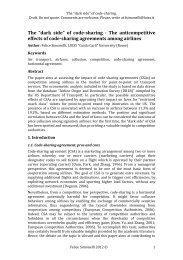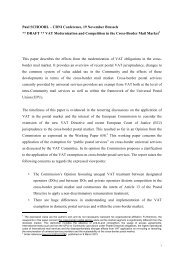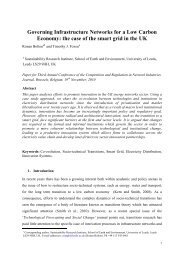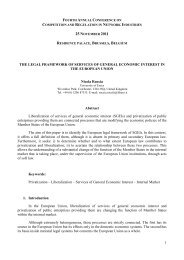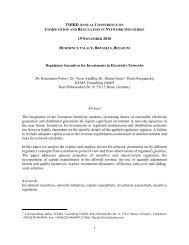Non-discriminatory Third Party Access to the Gas Transmission ...
Non-discriminatory Third Party Access to the Gas Transmission ...
Non-discriminatory Third Party Access to the Gas Transmission ...
You also want an ePaper? Increase the reach of your titles
YUMPU automatically turns print PDFs into web optimized ePapers that Google loves.
European countries <strong>the</strong>re is no pipe-<strong>to</strong>-pipe/system-<strong>to</strong>-system competition 24 and suppliers are<br />
dependent on a single pipeline/system if <strong>the</strong>y want <strong>to</strong> reach <strong>the</strong>ir cus<strong>to</strong>mers. It follows from (a)<br />
and (b) that undertakings that want <strong>to</strong> be connected <strong>to</strong> <strong>the</strong> transmission have no o<strong>the</strong>r option than<br />
seeking access <strong>to</strong> an existing transmission system. Therefore <strong>the</strong> TSO on a given transport market<br />
can often be considered <strong>to</strong> be in control of a natural monopoly. 25 In addition, TSOs of electricity<br />
transmission are also considered <strong>to</strong> be in control of a natural monopoly. 26 To have a monopoly<br />
position is not condemned in itself. It is, under Article 13 (1b) TGD and Article 14 SGR <strong>the</strong><br />
abuse of such a position by discriminating amongst system users, particularly in favour of its<br />
related undertakings that is prohibited. Competition law, in particular Article 102 (c) of The<br />
Treaty on <strong>the</strong> Functioning of <strong>the</strong> European Union 27 (TFEU), contains a similar prohibition as <strong>the</strong><br />
non-<strong>discrimina<strong>to</strong>ry</strong> TPA rule in <strong>the</strong> TGD and <strong>the</strong> SGR. Similar <strong>to</strong> <strong>the</strong> non-<strong>discrimina<strong>to</strong>ry</strong> TPA<br />
rule, Article 102 TFEU does not condemn, as such, <strong>the</strong> existence of a monopoly/dominant<br />
position. It is <strong>the</strong> abuse of such a position by discriminating amongst system users, particularly in<br />
favour of its related undertakings that is prohibited. Both rules prohibit <strong>the</strong> use, or ra<strong>the</strong>r abuse,<br />
of this dominant position of which is <strong>to</strong> expel (potential) competi<strong>to</strong>rs out of <strong>the</strong> market or<br />
imposing excessive conditions on cus<strong>to</strong>mers. To determine whe<strong>the</strong>r dominant firms are harming<br />
competition, a primarily effects-based approach is used; focusing on <strong>the</strong> economic impact of anti-<br />
24 It means that <strong>the</strong>re is only one pipeline or network available for a certain transportation way and <strong>the</strong>refore<br />
competition on a given transport market between TSOs does not exist.<br />
25 The definition of a natural monopoly is that <strong>the</strong> cost function is subadditive. This means that ‘a single buyer is<br />
technically able <strong>to</strong> serve <strong>the</strong> entire market at lower <strong>to</strong>tal costs than any feasible combination of two or more<br />
suppliers’. His<strong>to</strong>rically, <strong>the</strong> sec<strong>to</strong>rs most subject <strong>to</strong> natural monopolies have been <strong>the</strong> ‘<strong>the</strong> public utilities’, such as<br />
gas, electricity, water en telecommunications as well as various forms of transport. At <strong>the</strong> core of <strong>the</strong>se industries are<br />
‘indivisible’ assets such as pipes, cables, wires, satellites, rail and road links, waterways and so on. About this<br />
subject see: CREW, M. and PARKER, D. (2006) International Handbook on Economic Regulation. Massachusetts:<br />
Edward Elgar Publishing, p.41-47, KIP VISCUSI, W. (2005) Economics of Regulation and anti-trust. Cambridge:<br />
The MIT Press, Chapter 11: The <strong>the</strong>ory of a Natural Monopoly, NEWBERY, D.M. (1999) Privatization,<br />
Restructuring, and Regulation of Network Utilities. Cambridge: The MIT Press, p. 189 and LYONS, B. (2009)<br />
European Competition Policy- TheEconomic Policy. Cambridge: Cambridge University Press, p.11.<br />
26 Ibid.<br />
27 Article 102 TFEU: Any abuse by one or more undertakings of a dominant position within <strong>the</strong> internal market or in<br />
a substantial part of it shall be prohibited as incompatible with <strong>the</strong> internal market in so far as it may affect trade<br />
between Member States. Such abuse may, in particular, consist in:<br />
(a) directly or indirectly imposing unfair purchase or selling prices or o<strong>the</strong>r unfair trading conditions;<br />
(b) limiting production, markets or technical development <strong>to</strong> <strong>the</strong> prejudice of consumers;<br />
(c) applying dissimilar conditions <strong>to</strong> equivalent transactions with o<strong>the</strong>r trading parties, <strong>the</strong>reby placing <strong>the</strong>m at a<br />
competitive disadvantage;<br />
(d) making <strong>the</strong> conclusion of contracts subject <strong>to</strong> acceptance by <strong>the</strong> o<strong>the</strong>r parties of supplementary obligations which,<br />
by <strong>the</strong>ir nature or according <strong>to</strong> commercial usage, have no connection with <strong>the</strong> subject of such contracts.<br />
6



